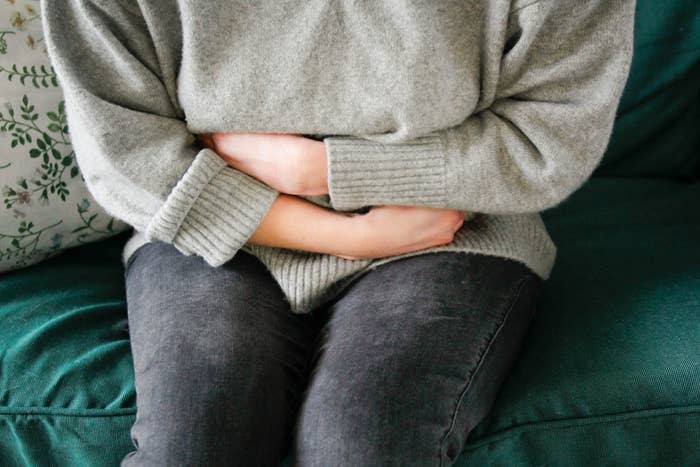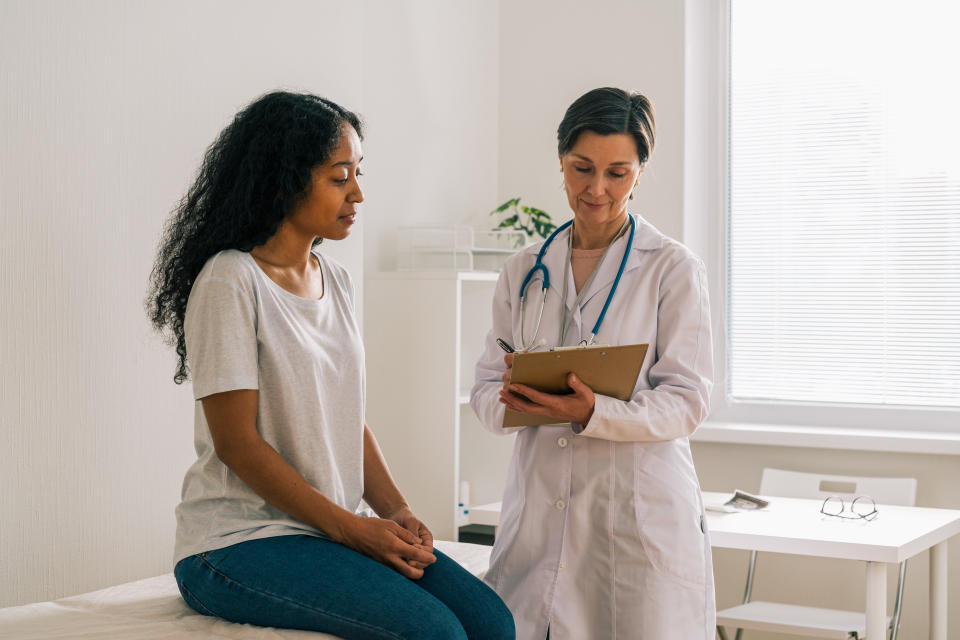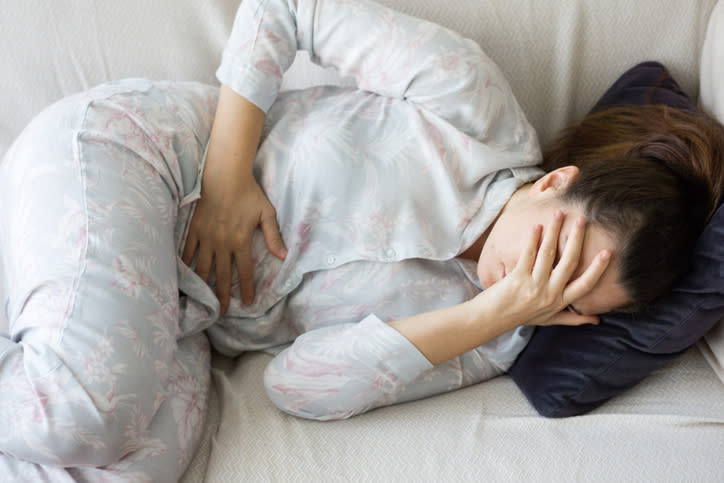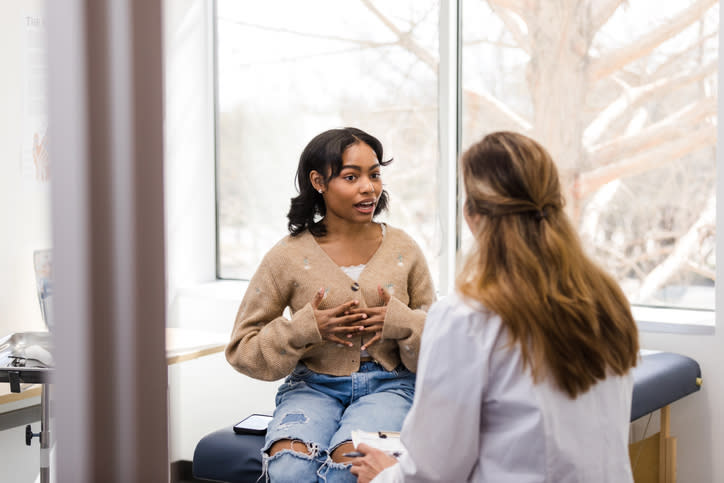Doctors Are Sharing Period Symptoms You Actually Shouldn’t Ignore
For people who get periods, a bit of menstrual pain is, unfortunately, a normal part of life.
Every month, the body releases an influx of hormones known as prostaglandins, which cause the uterus to squeeze and contract to shed its lining. The contractions can trigger throbbing cramps across your abdomen, and the wave of hormones can lead to pain and inflammation.
But there’s a fine line between what constitutes normal period pain and the type of pain that accompanies serious reproductive health conditions like endometriosis or uterine fibroids. Pain is complicated, and because we all experience pain differently, it can be tough to measure, quantify, and diagnose. In addition, people are often told from a young age that period pain, no matter how intense or irregular it might be, is normal. As a result, pelvic pain often gets minimized or dismissed.
“Because people only experience their own periods, they don’t always know when to ask for help or that there is anything that can be done to improve their symptoms and quality of life,” Dr. Megan Orlando, an assistant professor specializing in obstetrics and gynecology at the University of Colorado Anschutz Medical Campus, told HuffPost.
Below, reproductive health experts share the most common warning signs that your pain could be a cause for concern:
1. Irregular Or Very Heavy Bleeding

During menstruation, people typically bleed for three to seven days, with the first two days being the heaviest. If you’re bleeding longer than eight days or in between periods, you may have an underlying reproductive health condition.
Very heaving bleeding, which is defined as more than 80 milliliters over the course of your period, also suggests that something is amiss.
“This may look like bleeding heavily and quickly (soaking more than two pads per hour), passing clots, or fully soaking more than 16 regular pads or tampons during your periods,” said Dr. Elizabeth Kinsey, a fellow in complex family planning at the University of California, San Francisco.
According to Kinsey, abnormal or very heavy bleeding can be a sign of various conditions. It may be an indication of fibroids, which are benign tumors in or on the uterus; adenomyosis, in which endometrial tissue grows into the muscle of the uterus; or endometrial polyps, which are growths made of endometrial tissue that form in the uterus. In rare cases, heavy or irregular bleeding can be a sign of uterine cancer.
“It’s always a good idea to talk to your doctor if you think your bleeding is abnormal,” Kinsey said. “They can help determine with you if further work-up is needed.”
2. Incapacitating Pelvic Pain

With normal period pain, people are able to go about their daily activities or alleviate the mild pain or cramping with over-the-counter medications, Orlando said. That said, painful periods become a reason for concern if they start impacting your quality of life, for example, or causing you to miss school or work. Once the pain prevents you from carrying out your day-to-day activities, it’s important to get it checked out, Orlando advised.
When the debilitating pain is cyclic, meaning that it occurs at the same time every month, it could be a symptom of uterine fibroids or adenomyosis — two conditions that can cause extremely painful periods and sharp, stabbing cramps, according to Kinsey.
If the pain comes on suddenly and is severe, it may be a sign of a medical emergency, “such as an ovarian torsion, where an ovary twists on itself, or an ectopic pregnancy, where a pregnancy implants in an abnormal location,” Kinsey noted.
3. Noncyclic Pelvic Pain

Another red flag is noncyclic pelvic pain — that is, pain in or around the abdomen and pelvis that occurs even when you’re not menstruating. This can present in many ways. “It might happen daily or be triggered by certain activities such as physical activity, sex or bowel movements,” Orlando said.
Noncyclic pelvic pain occurs when people have been exposed to other types of pain — like painful periods, potentially due to endometriosis or adenomyosis — for a long time. The original source of pain can cause the pelvic and abdominal wall muscles to react or spasm, according to Orlando, and this, in turn, eventually makes those muscles become constant pain generators.
The surrounding nerves may also become hyperactive, causing pain even when you’re not menstruating. As a result, “people may then feel pelvic pain even outside of activities that would normally cause pain,” Orlando said.
4. Pain With Intercourse, Bowel Movements Or Urination

Dr. Gabrielle Whitmore, another assistant professor specializing in obstetrics and gynecology at the University of Colorado Anschutz Medical Campus, immediately becomes suspicious that a patient might have endometriosis — a condition in which the uterine lining grows outside the uterus — if they experience pain during intercourse or while going to the bathroom.
Individually, these symptoms may be linked to more common issues like constipation, a urinary tract infection or, in the case of painful sex, muscle spasms or oversensitive nerves.
“However, in some rare and extreme cases, endometriosis can start to grow on the bladder or even on the intestines and rectum,” said Whitmore.
When In Doubt, Have Your Pain Checked Out

Women and gender-diverse people often hear messages from friends, family, health care providers and the media about how menstruation should feel, Orlando said.
“Most of these messages reference pain and bleeding without contextualizing how much of either is normal, and what constitutes symptoms or suffering that can be treated,” she explained. It doesn’t help that there’s a strong stigma attached to menstruation, which can prevent people from talking about period pain openly and honestly.
Pay attention to your symptoms, and if you’re unsure whether what you’re experiencing is normal, go get checked out. There are treatments available, including prescription medications, physical therapy and surgery, that can relieve your pain and drastically improve the quality of your life.
“No one should have to experience pain that is debilitating, abnormal or impacting their everyday life,” Whitmore said.This article originally appeared on Huffpost.

 Yahoo Sports
Yahoo Sports 
